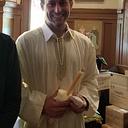Andrew Yang’s Anti-Charismatic Charisma
If Donald Trump taking the political world by storm in 2015 was a shocking event, then 2019 may be on a mission to top it. Seemingly every notable Democratic politician has jumped into the 2020 presidential election, from Kamala Harris to Bernie Sanders, an extremely unlikely candidate has emerged as, at least, the Internet’s favorite. Like Donald Trump, Andrew Yang has never held elected office, but that is where the similarities end. Yang has no prior fame to draw on as Trump did, and is soft-spoken and slightly awkward where Trump is a bombastic demagogue. Nevertheless, in a few short weeks the “Yang Gang” has become an overnight sensation, taking him from a candidate who was set to only carry his immediate family to one who will be included in the Democratic primary debates. Will this be merely a passing fad, the political equivalent of just another online meme like “Gangnam Style”? Or will it be the next stage in the evolution of the political outsider?
Andrew Yang’s resume does not immediately lend itself to the mantle of being a political outsider. His education is thoroughly that of the classical elitist- Phillips Exeter, Brown and then Columbia Law School. After graduating, he quickly became enmeshed in the world of venture capital, starting his organization Venture for America. His announcement for the Presidency in November 2017 was treated as a total afterthought, not even a joke because to joke about him would be to acknowledge his existence. This state of affairs would not last, however.
Yang’s ascent seemingly began with an appearance on the popular Joe Rogan Experience podcast, where he elaborated on his campaign platform centered around Universal Basic Income ($1,000 a month) and what he calls “human-centered capitalism.” Yang has now progressed to the point where he will, in fact, be a participant in the Democratic debates that will begin in June. In the latest polling he is ahead of well-established national names like Cory Booker, Amy Klobuchar and Kirsten Gillibrand.
Yang’s appeal is based in the fact that he is an anti-political seeming politician; this is similar in concept to the Trump phenomenon of 2016 but in content it is much different. Trump brought the flavor of reality tv and pro wrestling to the staid rhythms of traditional political theater. But as he has proved in substance to just be a more boorish version of a typical Republican President, with the majority of his Cabinet picks being either Bush administration retreads or similar GOP bigwigs. He is currently underwater in polling in the critical Midwestern states that switched to him after backing the Democrats in 2012, 2008 and before.
Yang’s demeanor in interviews is key to understanding his appeal. Although he does not have the fire typically associated with political outsiders or the sweeping rhetoric of a Barack Obama. When I listen to Yang, the quality I discern the most is a quiet earnestness. He has a geniune belief that he will find people willing to hear his ideas in good faith on venues as far apart politically as the Fox News Channel or the popular “dirtbag left” podcast Chapo Trap House. He maintains this demeanor when questioned on the viability of his signature “Freedom Dividend” (a universal basic income of $1,000 per month for every American), or even when aggressively interrogated on why his campaign has generated (seemingly) ironic support among online white nationalists (he clearly disavows such “support” while expressing a desire to build a more stable society that avoids political radicalization).
One of the central aspects of Donald Trump’s political outsider appeal is that, while all politicians are media trained, he speaks the language of non political media. He brought the language and mannerisms of reality television and pro wrestling to a debate stage, where the likes of Jeb Bush and Marco Rubio had no idea how to respond. Yang also speaks the language of non-political media, but his is that of the podcast that takes your mind off of your commute to work in the morning. He comes off as educating, rather than selling you something, even though he is. In an environment where brash charisma is increasingly being shown for the joke and fraud that it is, he is the ideal antidote.
Andrew Yang’s ant-charismatic charisma may never come close to catching on in the way that Trumpism, or even Obamaism, did. It may, ultimately, be too quiet and cerebral. But it has already given Yang more staying power than anyone could have predicted; already candidates with greater political pedigrees than he have dropped out of the race, such as Eric Swalwell, or are rumored to be doing so soon, such as John Hickenlooper. If he can continue to hang around in the Presidential race, he may not break five percent of the voters in Iowa or New Hampshire, but he may provide a template for a future outsider politician to deliver the change the country needs: interest in substance without seeming staidly bureaucratic, energy without bombast. A belief that ideas can transcend political divides, but without a naive faith that bipartisanship will come easy (which Obama himself has admitted was a fault of his early administration). I may not vote for Andrew Yang when the California primary comes around, but I do wish his campaign every success. We may not realize yet how much we need it.
